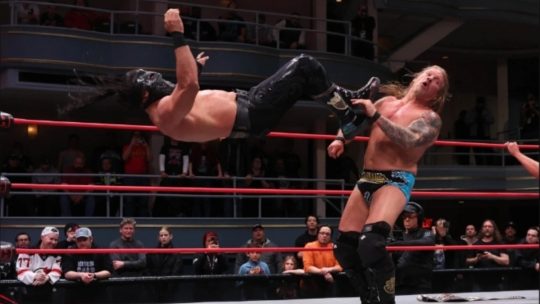As mentioned, WWE deleted the Jinder Mahal segment on Tuesday’s SmackDown from their Twitter account and never uploaded it to their YouTube account. In the segment, Jinder Mahal made fun of Nakamura, calling him “Mr. Miyagi,” saying he always “rooks the same,” and more.
The Washington Post has now written a story on the segment, titled “WWE has dealt with racism before, but a scripted rant has fans chanting ‘that’s too far!’”
In the article, WWE gave a statement:
When reached for comment, WWE said in a statement, “Just like many other TV shows or movies, WWE creates programming with fictional personalities that cover real world issues and sensitive subjects.”
Separating creative from corporate, WWE added, echoing nearly verbatim what it said following the Hogan scandal, “As a producer of such TV shows, WWE Corporate is committed to embracing and celebrating individuals from all backgrounds as demonstrated by the diversity of our employees, performers and fans worldwide.”
The article also has a few comments from Dave Meltzer:
“Wrestling was always in its own little world,” said Meltzer, 57. “Now everyone watches it, and you can’t get away with those kind of old tricks. The fan base will blame it on the company and not on the heel.”
“It’s an embarrassing thing [for WWE],” Meltzer added, noting the segment, which he called “really bad TV” made him feel more sympathetic for Mahal for having to deliver the uninspiring lines. “Nobody wants to be called racist.”
“The foreign heel goes back to 1900 or so, so it’s not anything new,” Meltzer said. “It’s easy and it kind of works when you do it the right way. … Heels would play on that ethnicity and you’d go as far as you could. I don’t want to say wresting was built on it, but it was big part of wrestling for decades and decades.”
“People are different, the product is different and society is different,” Meltzer said. “You look at stuff that was done even 15-20 years ago, and a large percentage of it, you’d go, you could never do that now.”
“I see this reaction as another example as to why they’ll be very careful not to do it again,” Meltzer added.
 More on Tessa Blanchard’s Return to TNA & Departure from CMLL
More on Tessa Blanchard’s Return to TNA & Departure from CMLL WWE RAW Ratings – Dec. 16, 2024 – Up [Update]
WWE RAW Ratings – Dec. 16, 2024 – Up [Update] AEW: Tony Khan Confirms AEW Rampage Ending “For Foreseeable Future”, Taz Makes Return at 12/22 Dynamite Tapings, Jamie Hayter vs. Julia Hart Set for Dynamite Fight for the Fallen 2025 Show
AEW: Tony Khan Confirms AEW Rampage Ending “For Foreseeable Future”, Taz Makes Return at 12/22 Dynamite Tapings, Jamie Hayter vs. Julia Hart Set for Dynamite Fight for the Fallen 2025 Show



